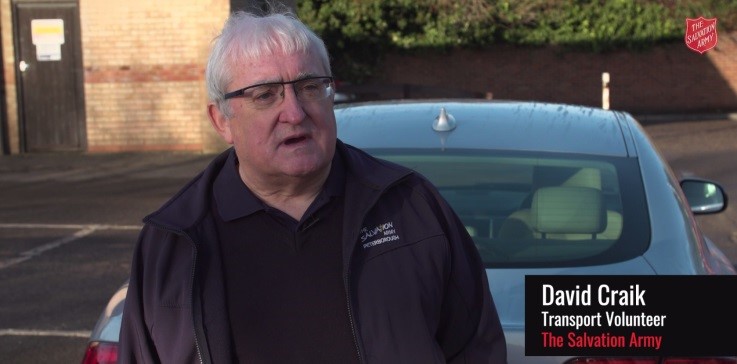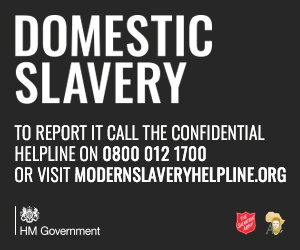David Craik is a volunteer for The Salvation Army. He is part of a team who pick up domestic slavery victims and relocate them to a safe place. It is a vitally important step in ending the exploitation of a victim.

I see too many domestic slavery victims. People who have been sold a lie and been exploited in their role as ‘house help’ by their ‘employers’. What’s so depressing is it’s a crime most people would never believe still happens in the UK. Victims are often kept away from others in their community with threats of violence, to them or family members. They can also be frightened into silence with threats of a bad juju curse being placed on them if they talk about their situation. Many of the victims I come into contact with have come to the UK with hopes of earning money to send home to family members or getting an education to further their career opportunities. But some don’t have a choice and are brought here after being sent or sold by family members back home overseas.
Once living in the UK, victims are treated terribly. They can be beaten, forced to work exhausting hours and deprived of food and water. They are frightened and in a foreign country so have no one they can turn to for help. That’s why it’s so important we work together as communities to spot the signs of this kind of slavery when it is happening around us. If a victim’s case is reported – action can be taken. An anonymous call to The Salvation Army can lead to direct action. The charity works with many organisations to help a victim not only out of slavery, but to help re-build their life.
The journey to escape from domestic slavery starts with an interview with a referral officer to confirm they are a victim, and then moves on to me and my colleagues who make up the transport team.
When we get the call – we act quickly to get to the place of rescue or escape and transport the victim to somewhere safe. This might be one of The Salvation Army’s safe houses. The key is that it is as far away from where the victim has been kept to avoid recapture. This means we do long journeys but we make sure it is comfortable. There are always two of us in the vehicle; a driver and a chaperone both ready to offer support and a friendly smile to the now freed victim.
A case that particularly sticks in mind was a little Nigerian family as we transported the lady, and her two children to safety. It was a particularly harrowing case as they had been kept in such dreadful circumstances that you wouldn’t wish upon anybody.
I find the whole process hugely rewarding personally. The best feedback is the smile on people’s faces and the hug that they want to give you because they feel they’ve been cared for and they feel they’re in a place of safety. And there’s a role for all of us in this. At the very least – being alert to where it may be happening and being prepared to do something about it.
BOX OUT
If you think someone might be a victim of domestic slavery, considering the following questions can help you more confidently ‘spot the signs’:
- What conditions are they living in?
- Does the person ever leave the house on their own?
- Do they seem afraid or anxious around others?
- Do they seem to be treated differently to other members of the family?
- Do they seem as though they can freely contact their friends or family?
- Do they appear to work excessive hours?
- Do you know if their passport or any official documents have been taken away?
Domestic slavery is often closer than you think. If you find the above questions raising concern in your mind, and you think you’ve come across someone who might be a victim in need of help, do the right thing and call The Salvation Army’s referral helpline 0300 3038151. It is available 24/7, is confidential, and anonymous. The only person who will know someone made a call will be the victim. More information can be found on the Salvation Army website: https://www.salvationarmy.org.uk/modern-slavery.











